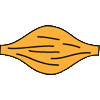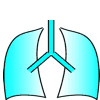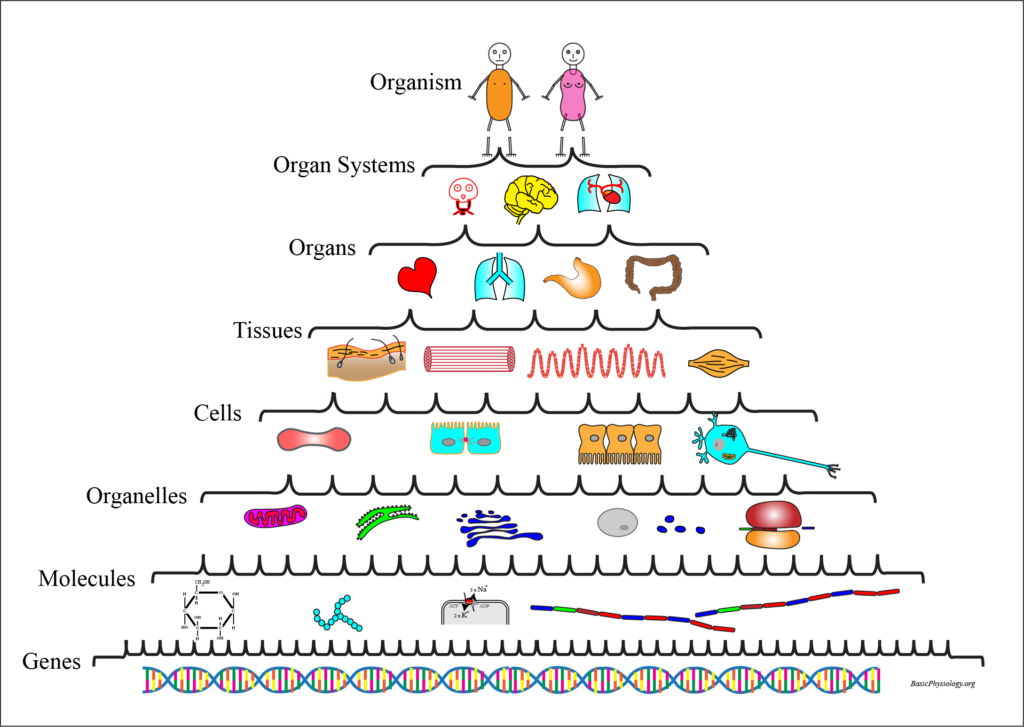A. What is Physiology?
1.
Physiology is the science that studies the function of an organism; i.e. a body.
2.
It studies for example how the heart beats, or how the stomach digests or how the lungs breathe.
3.
It can also study how other bodies (= animals) or plants or bacteria function.
In this site, we will stick to the human body, which is complicated enough!





1.
As a physiologist, we look at the human body at different levels. From very small to very large (see figure).
2.
At the smallest level, we look at the genes, molecules, enzymes, hormones that occur in and around cells.
An important component at this level is the cell membrane, which divides the fluid that is inside the cell (the cytosol) from the fluid that is outside the cell (= the extracellular space).
4.
The next level is the cell. This is THE basic unit of the body. It contains different types of organelles (=small organs), such as mitochondria, nucleus, etc. And all this is packaged (surrounded) by the cell membrane.
5.
At a higher level, we look at how cells work together, for example in tissues, such as in muscles, in the heart or in the brain. Tissues can also be fluids, such as blood or lymph.
6.
At the next higher level we look at groups of cells and tissues that make up an organ, such as the heart, the lungs, the stomach or the brain.
7.
At the following higher level, physiologist look at organ systems, such as the circulation system that combines the heart, the arteries, veins, lymph vessels etc. into one ‘system’.
8.
Other organ systems are the nervous system (brain, nerves etc.), the respiratory system, the reproductive system, etc.
9.
Finally, at the top of this whole pyramid, we reach the level of the organism, the whole body, the organism, which is the total of all the organ systems put together.
10.
And this whole body is surrounded (packaged) by another organ: the skin!
1.
Physiology is part of the medical sciences.
2.
Some of these science subjects are basic (basic knowledge) while others are more clinical (applied).
3.
Other basic medical sciences are Anatomy (which describes the structure of the body) and Biochemistry(which describes the chemical processes in the body).
4.
Clinical sciences are easily visible in the hospital such as Cardiology (science of the heart), Surgery (cutting!), Neurology (science of the brain and nerves), etc.
1.
Students that study physiology are, most often, students that follow a study in healthcare; such as nursing, midwife, dentistry, doctor, etc.
2.
As a basic science, Physiology, together with Anatomy and Biochemistry, are the subjects that these students will study first.
3.
Later, other subjects will be taught such as Pharmacology (study of drugs), Pathology (study of diseases), Microbiology (study of viruses and bacteria), etc.
4.
Then, finally, students will learn specific topics in nursing, physiotherapy, medical practitioner, general physician, cardiologist, neurosurgeon etc., etc.
5.
Physiology is also taught to biologist; to study the function of other organisms, such as dogs, cattle, bacteria etc.
6.
And, even in agriculture, there is a fair amount of physiology such as in plants, the function of roots, the breathing of forests etc.
1.
Physiologists usually work at universities or other institutions of higher learning where people study to become nurses, doctors etc.
2.
In several countries, one can study to become a physiologist, usually in a graduate program terminated with a PhD (=Doctor in Philosophy).
3.
So, your physiology teacher could have a PhD in a physiological subject.
4.
But, often, those teaching physiology have a background in Biology or in some other Health Care specialization.
In my case, I first studied medicine, from basic to general practitioner. But then, when I was finished, I realized I liked to teach and to do research much more than treating patients. So, that’s how I became a physiologist!
6.
Yes, physiologists often have the possibility of performing research, to understand better how a cell, a tissue, an organ or an organ system works, in a normal or in a pathological situation.
Denis Noble: Many textbooks have described the different levels in physiology, but I found the best description in Dennis Noble’s book, “The Music of Life,” Oxford University Press, 2006.
